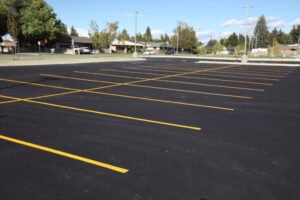Parking Lot Paving in Texas, TX: The Complete Guide to a Durable Surface

In a state as vast and economically dynamic as Texas, properly paved parking lots are essential for businesses, apartment complexes, shopping centers, schools, and public facilities. Whether you’re building a new commercial space or upgrading an existing one, Parking Lot Paving in Texas, TX is a crucial investment in safety, functionality, and first impressions.
This comprehensive guide will walk you through everything you need to know about parking lot paving in Texas: the benefits, materials used, installation process, cost factors, maintenance needs, environmental considerations, and tips for choosing the right contractor. At the end, we’ll also answer five frequently asked questions.
Why Parking Lot Paving in Texas, TX Matters
A well-maintained parking lot does more than provide a place to park. It represents your business, enhances safety, improves traffic flow, and prevents costly repairs down the line.
Here’s why investing in professional parking lot paving in Texas, TX is essential:
- First Impressions: Customers judge your business by how your property looks.
- Safety: Smooth, well-marked surfaces reduce the risk of accidents.
- Compliance: ADA-compliant markings and slope regulations are required by law.
- Property Value: A properly paved lot boosts commercial property valuation.
- Longevity: Paved lots last longer and require fewer major repairs than gravel or dirt surfaces.
- Popular Materials Used for Parking Lot Paving in Texas
The material you choose affects durability, appearance, cost, and maintenance. Common options in Texas include:
1. Asphalt
- Most popular due to its affordability, flexibility, and quick installation
- Withstands Texas’ hot climate well with proper maintenance
- Easily repaired and sealcoated
2. Concrete
- Long lifespan and excellent load-bearing capacity
- Higher upfront cost but less frequent maintenance
- Better for areas with high volumes of heavy trucks
3. Recycled Asphalt (RAP)
- Environmentally friendly and cost-effective
- Suitable for industrial or rural parking lots
For most commercial projects in Texas, asphalt is the go-to option due to its cost-effectiveness and performance in fluctuating weather conditions.
Parking Lot Paving Process in Texas, TX
Professional parking lot paving follows a detailed process to ensure structural integrity and longevity.
1. Site Assessment and Planning
- Evaluate soil conditions, drainage, traffic flow, and usage
- Design layout for efficiency, accessibility, and compliance with city codes
2. Excavation and Grading
- Remove topsoil and debris
- Grade the site to ensure proper drainage and surface water runoff
3. Sub-Base Installation
- Lay a stable base of crushed stone or gravel
- Compact thoroughly to prevent future shifting and potholes
4. Binder and Surface Layers
- Apply binder layer (if needed) for added structural support
- Top with hot mix asphalt or concrete and smooth with rollers
5. Curing and Striping
- Allow the surface to cure (24-72 hours for asphalt, longer for concrete)
- Paint lines for parking spots, ADA markings, directional arrows, and signage
How Long Does It Take to Pave a Parking Lot?
- Small Lots (up to 10,000 sq. ft): 1–2 days
- Medium Lots (10,000 to 50,000 sq. ft): 3–5 days
- Large Commercial Lots: Up to 1–2 weeks, depending on complexity and weather
Curing time varies by material and temperature. Asphalt is usually ready faster than concrete.
Cost of Parking Lot Paving in Texas, TX
Costs depend on several factors:
- Size of the lot
- Type and thickness of material
- Grading and drainage needs
- Labor and permit requirements
- Striping and ADA compliance
Average Pricing
- Asphalt Parking Lots: $2.50 – $5.00 per sq. ft.
- Concrete Parking Lots: $5.00 – $9.00 per sq. ft.
- Sealcoating (optional): $0.10 – $0.30 per sq. ft.
Always request itemized quotes to compare costs and ensure nothing is hidden.
Benefits of Asphalt Parking Lot Paving in Texas, TX
- Heat Resistance: Withstands high Texas temperatures without cracking excessively
- Fast Installation: Ideal for businesses that can’t afford long downtime
- Smooth Surface: Enhances driving comfort and reduces wear on vehicles
- Cost-Effective Repairs: Easy to patch, sealcoat, or overlay when needed
- Aesthetic Appeal: Looks clean and professional when regularly maintained
Maintenance Tips for Parking Lots in Texas
To extend the lifespan of your parking lot and protect your investment:
- Sealcoat every 2-3 years to shield against UV rays, oil spills, and moisture
- Fill cracks immediately to prevent water infiltration and deeper damage
- Restripe faded markings to maintain ADA compliance and traffic control
- Sweep regularly to remove debris, sand, and oil that deteriorate the surface
- Inspect after storms for signs of erosion, standing water, or edge damage
Sustainability and Environmental Benefits
Texas is making strides in sustainable construction. Parking lot paving can be eco-friendly with options like:
- Permeable asphalt or concrete that allows stormwater to pass through
- Recycled asphalt pavement (RAP) to reduce material usage and landfill waste
- Solar-powered lighting and striping to minimize carbon footprint
- Native landscaping around parking lots to reduce runoff and heat absorption
Choosing the Right Parking Lot Paving Contractor in Texas, TX
Selecting the right contractor ensures your parking lot is functional, compliant, and durable.
Look for these qualities:
- Licensed and insured in the state of Texas
- Proven track record with commercial paving projects
- Transparent pricing and detailed written estimates
- Experienced crew and modern equipment
- Willingness to explain the process and offer warranties
Ask about:
- Timeline and availability
- Materials used and sourcing
- Striping, signage, and ADA compliance
- References from past clients
Common Mistakes to Avoid
- Choosing the lowest bid without verifying quality
- Ignoring sub-base preparation
- Skipping drainage planning
- Forgetting to schedule routine maintenance
- Neglecting compliance with ADA and city codes
Final Thoughts: Invest in Long-Term Quality
Whether you’re planning a new commercial development or upgrading an existing property, Parking Lot Paving in Texas, TX is an investment in your business’s image, safety, and functionality.
By choosing the right materials, hiring a qualified contractor, and maintaining the surface regularly, you ensure that your parking lot lasts for decades with minimal issues. A well-designed, properly paved lot not only attracts customers but also reduces liability and costly repairs.
Now let’s answer some common questions.
Frequently Asked Questions (FAQs)
1. How long does an asphalt parking lot last in Texas?
With proper installation and regular maintenance like sealcoating and crack filling, an asphalt parking lot in Texas can last 15 to 25 years.
2. What is the best time of year to pave a parking lot in Texas?
Spring through early fall is ideal. Paving in temperatures above 50°F ensures proper curing and compaction, especially for asphalt.
3. How often should I sealcoat my parking lot?
Sealcoating should be applied every 2 to 3 years to protect against UV damage, water infiltration, and vehicle fluids.
4. Can I pave over an old parking lot?
Yes, but it depends on the condition of the existing surface. If the base is stable, a new asphalt overlay can be applied. Otherwise, full removal and repaving may be necessary.
5. Do I need permits for parking lot paving in Texas?
Yes. Most Texas cities require permits and inspections for commercial paving. Always check with local municipalities and ensure your contractor handles the paperwork.
For long-lasting, professional parking lot paving in Texas, TX, choose a contractor who understands local conditions, materials, and regulations. Done right, your parking lot can serve your business—and your customers—for decades to come.
